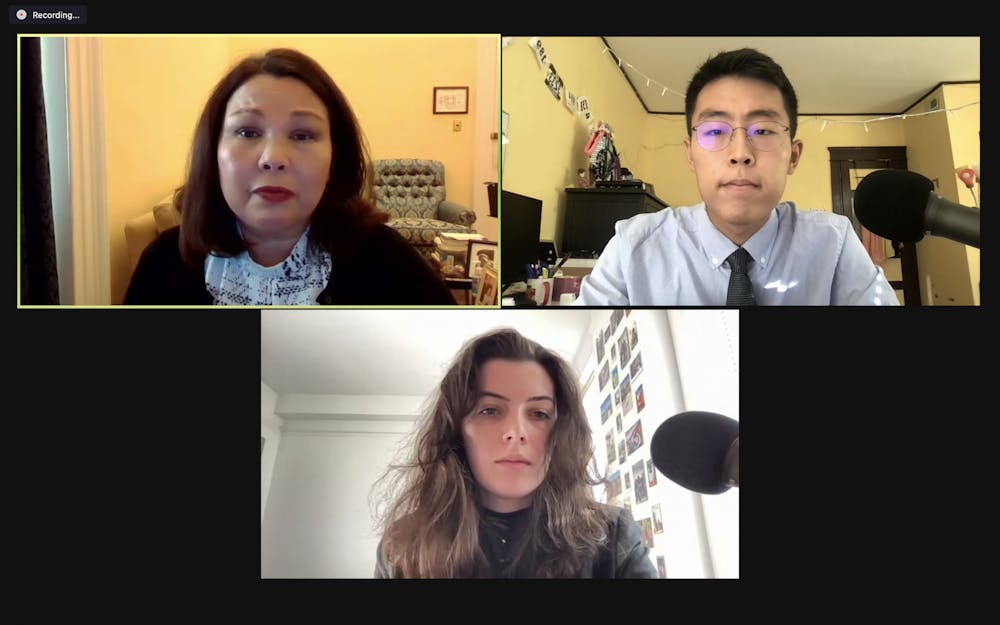The Podcast on Foreign Affairs (POFA) was founded by three students in 2017 for the purpose of encouraging conversations about international relations on campus. The organization has since interviewed many notable guests, including the former vice president of Taiwan and Senator Tammy Duckworth.
In an interview with The News-Letter, sophomore Indi Aufranc, POFA’s chief marketing officer, discussed how the organization prioritizes not the notoriety of speakers but rather the unique perspectives they will bring to the episode when choosing whom to invite.
“We’ve had a lot of guests and honestly, no matter their notoriety, it depends on how good of a speaker they are,” she said. “We’ve had some guests with not a huge following who’ve been transformative to talk to.”
Junior Julia An, POFA’s chief executive officer, feels that one of the most important aspects of the podcast is its ability to share perspectives of guests that listeners may not otherwise hear from.
“The coolest guests are guests whose perspectives you wouldn’t necessarily get just reading an article on them on the internet or hearing an interview with them from CNN or Fox News,” she said. “Just being on the podcast alone and being able to host something like this and interact with guests who have such interesting and unique experiences has first of all taught me that it doesn’t really matter that caliber of the person.”
An also mentioned the podcast’s role in creating a dialogue between students and professionals. She hopes the podcast will bridge the gap between those without a strong understanding of foreign affairs and experts in the field.
Aufranc discussed what the producers of the podcast hope their media will bring to their listeners, particularly those who may not be majoring in International Studies.
“All [POFA members] are really passionate about international relations and global news, but we’re also passionate about making international issues accessible to people who may not be studying it in college,” she said. “The goal of every episode is to build from beginner knowledge to expert knowledge in 30 to 45 minutes.”
An echoed Aufranc’s sentiment of the podcast being a beginner-friendly way to gain a better understanding of foreign affairs.
“Our episodes start off with something that’s more general, like the background on an issue or the background on something that’s important that happened in the field of international relations, and then we make it more specific,” she said. “We honestly just hope that listeners are able to follow that discussion [and] take something away from it that they didn’t know beforehand.”
According to Aufranc, the podcast gets the majority of its listenership from the Baltimore area and other East Coast cities, though it is beginning to gain traction internationally. The podcast’s second-largest listenership is in Brazil, and some listeners tune in from Canada, Australia and Europe.
DJ Quezada, a sophomore majoring in International Studies and History, occasionally listens to the podcast. While he has enjoyed some episodes that he felt presented facts in a balanced and historically fair way, Quezada raised concerns about the podcast being marketed to those without a strong knowledge base in international relations.
“[Some guests] are from very conservative think tanks that, I think, push a very particular and partisan view of certain international relations topics,” he said. “I think they host a lot of think tanks that receive funding from weapons contractors on topics that are related to the military and don’t necessarily disclose that. I think that’s a very, very, very important thing, especially in a podcast that’s marketed towards people who are just starting to get into international relations.”
While Quezada understands the podcast is student run and does not expect perfection, he hopes in future episodes they will be more critical of their guests.
“We’re students, we’re at a university, we have the freedom to be critical,” he said. “So when we have somebody from The Heritage Foundation talking to us, why don’t we press them?... I’m not saying be mean, but be fair and say, ‘We understand that there may be a conflict here. Let’s discuss that; why do you feel like you’re still able to give objective commentary with this kind of compromising interest?’ I think if we have the freedom to do that, we should do it a lot more often.”
In an email to The News-Letter, An addressed Quezada’s criticisms. She emphasized POFA’s mission of letting its listeners engage in international relations impartially.
“The responsibility of our hosts is to delve with guests into and help them lay out the underlying assumptions and principles behind their viewpoints,” she wrote. “With the exception of misleading and harmful opinions or factually incorrect statements, it is not the responsibility of our hosts to challenge a guest whenever they disagree with the guest’s views.”
Chris H. Park is POFA’s Editorial Officer and a Senior Staff Writer for The News-Letter. He did not contribute to the reporting, writing or editing of this piece.





